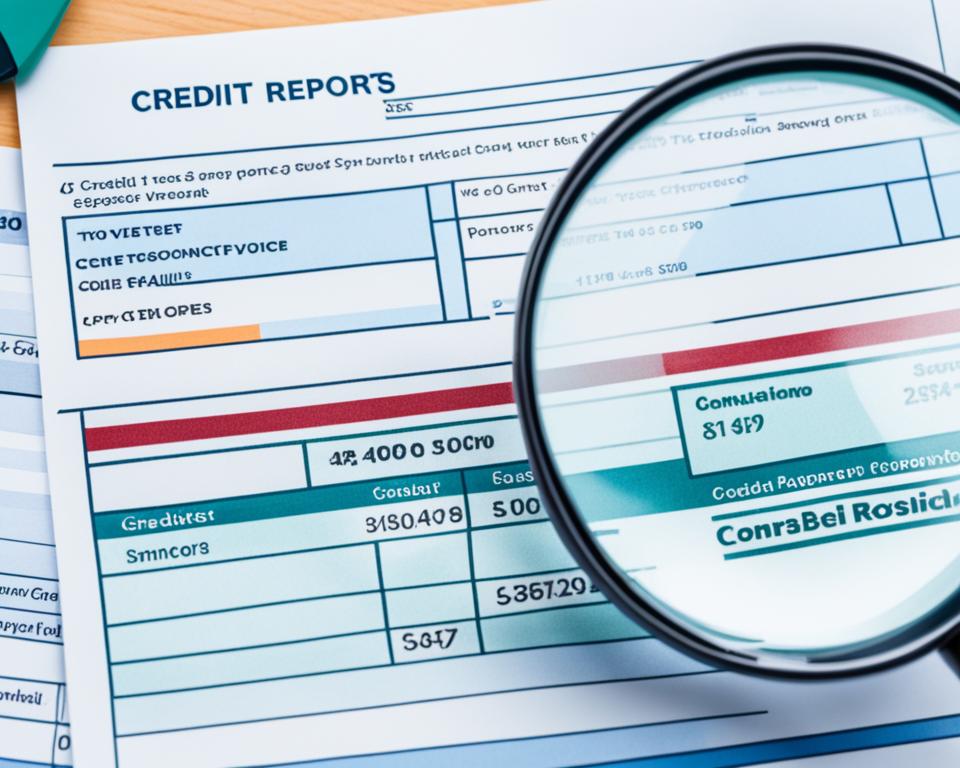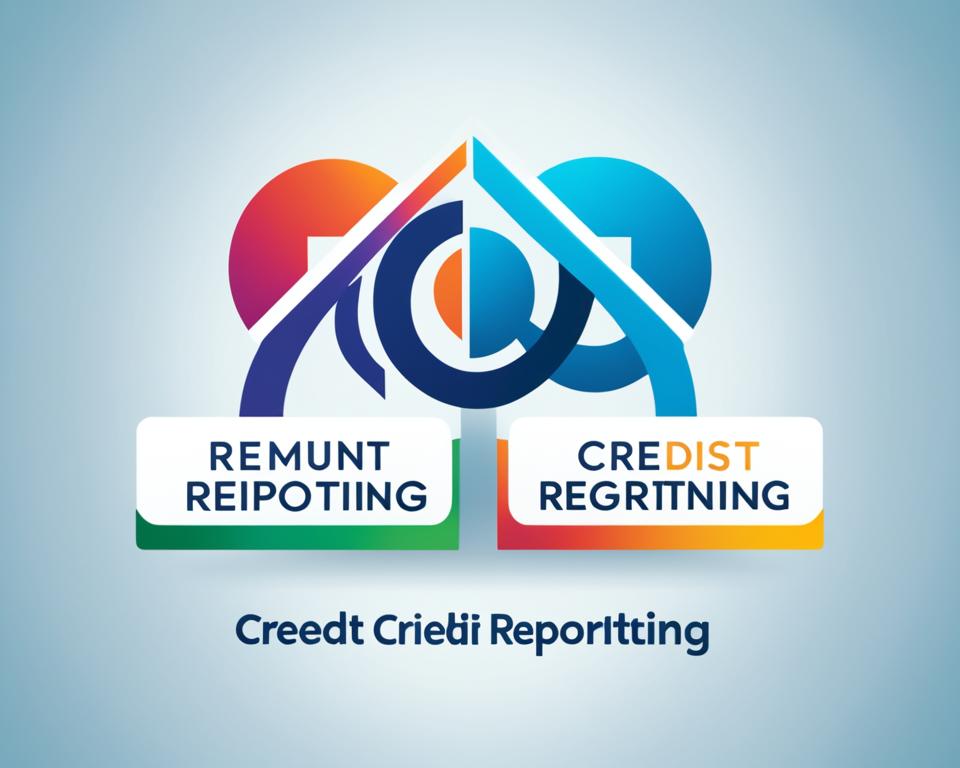When it comes to credit reports and scores, many people wonder which credit bureau is the most widely used. In the United States, there are three major credit reporting agencies: Experian, Equifax, and TransUnion. These agencies collect and maintain consumer credit information, which is used by lenders and financial institutions to make important decisions.
While the question of which credit bureau is the most used may not have a straightforward answer, it’s important to understand that all three of these agencies are widely utilized and considered to be accurate and important. Each credit bureau has its own unique database of consumer information, which lenders can access to assess an individual’s creditworthiness.
Key Takeaways:
- The most widely used credit scoring model, FICO Score, is used by lenders in 90% of lending decisions.
- Understanding credit reports and credit scores is crucial for making informed financial decisions.
- Credit scores can vary across different credit bureaus due to various factors, including different information reported and scoring models used.
- Factors that affect credit scores include payment history, credit utilization, length of credit history, credit mix, and new credit.
- FICO Score is considered the most widely used credit score in lending decisions, but there are other scoring models.
Understanding Credit Reports and Credit Scores
To make informed financial decisions, it is crucial for consumers to understand the basics of credit reports and credit scores. A credit report is a compilation of information about an individual’s credit history and financial activities. It provides a comprehensive view of the individual’s borrowing and repayment behavior, including details about their loans, credit cards, and other credit obligations.
How Credit Reports Work: Credit reports are created and maintained by credit bureaus, which are independent organizations that collect and compile consumer credit information. The three major credit bureaus in the United States are Experian, Equifax, and TransUnion. These bureaus collect information from various sources, such as lenders, credit card issuers, and public records, to create comprehensive credit reports for individuals.
“A credit report is like a financial report card that creditors use to assess an individual’s creditworthiness.”
Credit reports contain a wealth of information, including personal identifying details, accounts, payment history, credit limits, credit utilization, and any negative information such as late payments or accounts in collections. It is essential for individuals to review their credit reports regularly to ensure accuracy and identify any potential errors or fraudulent activities.
Credit scores, on the other hand, are numerical representations of an individual’s creditworthiness. The most commonly used credit scoring models are the FICO Score and VantageScore. These scores are generated based on the information in the credit report and serve as a quick and standardized way for lenders to evaluate an individual’s creditworthiness.
How Credit Scores Are Calculated:
- Payment History: Whether the individual has paid their credit obligations on time
- Credit Utilization: The proportion of available credit that the individual is using
- Length of Credit History: The age of the individual’s credit accounts
- Credit Mix: The types of credit accounts an individual has (e.g., credit cards, loans)
- New Credit: Recent credit inquiries and account openings
These factors are weighted differently and combined to generate a three-digit credit score. A higher credit score indicates lower credit risk and reflects a stronger credit profile, making it easier for individuals to access loans, credit cards, and favorable interest rates.
Building a strong credit history is crucial for individuals who want to improve their credit scores. It involves making payments on time, keeping credit card balances low, maintaining a diverse mix of credit accounts, and limiting new credit applications.
Variation in Credit Scores Across Credit Bureaus
When it comes to credit scores, it’s important to understand that they can vary across different credit bureaus. This variation occurs due to several factors, which can lead to different credit scores being reported by each bureau. Let’s explore the reasons behind this variation.
Different Information Reported
One contributing factor to credit score variation is the fact that credit bureaus may have different information. Lenders are not required to report to every credit bureau, which means that one bureau may have more complete or updated information than another. This disparity in data can result in varying credit scores.
Different Scoring Models and Algorithms
Another reason for credit score variation is the use of different scoring models and algorithms. Each credit bureau may use a different method to calculate credit scores, even when utilizing the same source data. These variations in scoring models and algorithms can lead to differences in credit scores across different credit bureaus.
It’s important for consumers to be aware of these variations and understand that there is no single “most accurate” credit score. Different credit bureaus may provide different scores, but this doesn’t necessarily mean that one is more accurate than the other. Instead, it’s crucial to focus on maintaining a positive credit history and managing credit responsibly.
To provide a visual representation of credit score variation, here is a table comparing credit scores from different credit bureaus:
| Credit Bureau | Credit Score Range |
|---|---|
| Experian | 300-850 |
| Equifax | 280-850 |
| TransUnion | 330-830 |
As you can see, each credit bureau has its own credit score range, further highlighting the variation in credit scores.
Understanding and monitoring your credit scores across multiple credit bureaus can provide a more comprehensive picture of your creditworthiness. This information empowers you to make informed financial decisions and take proactive steps to improve your credit standing.

“Credit scores can vary across different credit bureaus due to several factors, such as different scoring models and the availability of information from lenders. It’s important for consumers to be aware of these variations and focus on managing their credit responsibly.”
Factors Affecting Credit Scores
When it comes to determining credit scores, several factors play a crucial role in evaluating an individual’s creditworthiness. Understanding these factors can help individuals make informed decisions and take steps to improve their credit standing.
Payment History
Payment history is one of the most influential factors affecting credit scores. It reflects an individual’s track record of repaying debts on time. Late payments, defaults, or delinquencies can have a negative impact on credit scores, while consistent, timely payments contribute to a positive credit history.
Credit Utilization
Credit utilization refers to the amount of available credit that an individual uses. It is calculated by dividing the total credit card balances by the total credit limits. High credit utilization, exceeding 30% of available credit, can negatively impact credit scores. Keeping credit utilization low demonstrates responsible credit management and can contribute to an improved credit profile.
Length of Credit History
The length of credit history is another significant factor in determining credit scores. It takes into account the age of the oldest account, the average age of all accounts, and the age of the newest account. A longer credit history demonstrates a track record of responsible credit management over time, contributing positively to credit scores.
Credit Mix
Diversification in credit types can positively impact credit scores. Credit mix refers to the variety of accounts an individual holds, such as credit cards, mortgages, student loans, or auto loans. Demonstrating the ability to manage different types of credit responsibly can enhance creditworthiness.
New Credit
Opening new credit accounts, such as credit cards or loans, can temporarily impact credit scores. The number of recent inquiries and newly opened accounts play a role in determining creditworthiness. It is advisable to be selective about applying for new credit to avoid potential negative effects on credit scores.
| Factors Affecting Credit Scores | Impact on Credit Scores |
|---|---|
| Payment History | Positive payment history contributes to higher credit scores, while late payments or delinquencies can lower scores. |
| Credit Utilization | Maintaining low credit utilization, ideally below 30% of available credit, can positively impact credit scores. |
| Length of Credit History | Having a longer credit history demonstrates responsible credit management, resulting in higher credit scores. |
| Credit Mix | Diversifying credit types and managing various accounts responsibly can improve credit scores. |
| New Credit | Opening multiple new credit accounts or having numerous recent credit inquiries can temporarily lower credit scores. |
It is important to note that the significance and impact of these factors may vary based on individual circumstances. Understanding these factors can empower individuals to take proactive steps towards building and maintaining a healthy credit profile.
Importance of FICO Score
When it comes to credit scoring models, the FICO Score stands out as the most widely used credit score in lending decisions. A staggering 90% of lenders rely on the FICO Score to assess an individual’s creditworthiness. This popularity can be attributed to its longstanding reputation and widespread adoption in the industry.
While other credit scores exist, the FICO Score holds significant importance for both lenders and borrowers. Lenders trust the FICO Score because it has proven to be a reliable indicator of creditworthiness over the years. Borrowers, on the other hand, value the FICO Score because it directly impacts their ability to secure favorable financial products, such as loans and credit cards.
It’s important to note that even within the FICO Score, slight variations can occur. These variations may arise due to different scoring models or specific versions of the FICO Score used by lenders. Therefore, it’s crucial for individuals to stay informed and monitor their credit scores regularly.
Why is the FICO Score so important?
The FICO Score holds immense importance for individuals seeking financial stability and opportunities. Here are a few reasons why:
- Widely recognized: The FICO Score is recognized and accepted by lenders and financial institutions across the United States.
- Standardized credit assessment: The FICO Score provides a standardized way for lenders to assess the creditworthiness of borrowers, enabling fair lending practices.
- Access to favorable terms: A higher FICO Score can help individuals secure loans and credit cards with better terms, including lower interest rates, higher credit limits, and more favorable repayment options.
- Financial opportunities: With a strong FICO Score, individuals can access a wide range of financial opportunities, such as mortgages, auto loans, and personal loans, allowing them to achieve their goals and aspirations.
Understanding the FICO Score table
To better understand the significance of the FICO Score, let’s take a look at the credit score ranges along with their corresponding creditworthiness:
| FICO Score Range | Creditworthiness |
|---|---|
| 800 – 850 | Exceptional |
| 740 – 799 | Very Good |
| 670 – 739 | Good |
| 580 – 669 | Fair |
| 300 – 579 | Poor |
With a high FICO Score, individuals fall into the “exceptional” or “very good” creditworthiness categories. This positions them favorably in the eyes of lenders and increases their chances of obtaining credit on favorable terms.
It is crucial to remember that while the FICO Score is of utmost importance, it is not the only factor that lenders consider when making lending decisions. They may also take into account other factors such as income, employment history, and debt-to-income ratio. Therefore, individuals should strive to maintain a holistic financial profile to enhance their creditworthiness.

Overview of the Major Credit Bureaus
In the United States, the three major credit bureaus that play a pivotal role in the financial industry are Experian, Equifax, and TransUnion. These credit bureaus are responsible for collecting and maintaining consumer credit information, which is then used to generate credit reports. Lenders and individuals rely on these reports to assess creditworthiness and make informed financial decisions.
While Experian is the largest credit bureau, boasting an extensive database of consumer credit information, all three bureaus are widely utilized and recognized as essential entities in the industry. Each bureau collects data from various sources, including lenders, credit card issuers, and public records, to ensure comprehensive credit reporting.
The Fair Credit Reporting Act (FCRA) is a federal law that governs the operations of these major credit bureaus. It grants the government the authority to oversee and regulate their activities, ensuring consumer protection and fair practices in credit reporting.
To provide a better understanding of the major credit bureaus and their significance in the financial landscape, refer to the following table:
| Credit Bureau | Key Features |
|---|---|
| Experian | Largest credit bureau Extensive consumer credit information database Provides credit reports to lenders and individuals |
| Equifax | Well-established credit bureau Comprehensive credit reporting Offers credit reports and solutions for businesses |
| TransUnion | Trusted credit bureau Provides credit reports and scores to lenders and individuals Offers various credit-related services |
How to Access Your Credit Score
Accessing your credit score is an important step in understanding your financial standing and making informed financial decisions. Fortunately, there are several ways to obtain your credit score and access your credit report.
One of the easiest and most reliable methods is to request a free copy of your credit report once a year from each of the major credit bureaus through AnnualCreditReport.com. This website, authorized by the federal government, allows you to access your credit report from Experian, Equifax, and TransUnion.
Another option is to check with your bank or credit card company. Many financial institutions provide access to credit scores, including the base FICO Score. This can be a convenient way to stay updated on your creditworthiness.
It’s important to exercise caution when accessing free credit reports online. Be aware of fraudulent websites that may try to charge you for unnecessary services or collect your personal information. Stick to reputable sources like AnnualCreditReport.com and trusted financial institutions.
Remember, your credit score plays a crucial role in determining your eligibility for loans, credit cards, and other financial opportunities. By regularly accessing and monitoring your credit score, you can stay informed and take proactive steps to improve your creditworthiness.

Benefits of Accessing Your Credit Score:
- Understanding your financial standing
- Identifying areas for improvement
- Making informed financial decisions
- Monitoring for potential fraud or identity theft
“Accessing your credit score is like checking your financial pulse. It gives you valuable insights into your creditworthiness and empowers you to take control of your financial future.”
– Financial Expert
Take advantage of the accessible tools and resources available to access your credit score and stay informed about your financial health. By staying proactive and knowledgeable, you can navigate the world of credit with confidence.
| Method | Pros | Cons |
|---|---|---|
| AnnualCreditReport.com | Free access to credit reports from major bureaus | Only provides credit reports, not scores |
| Financial institutions | Convenient access to credit scores | May require an account with the institution |
| Third-party credit monitoring services | Regular updates and alerts | May have subscription fees |
Building Strong Credit
Building strong credit is an essential part of managing your financial health. Lenders consider your credit history when evaluating loan applications, and a solid credit profile can increase your chances of approval and lower your interest rates. Here are some key strategies for building credit:
Making Payments on Time
One of the most important factors in building credit is consistently making payments on time for all your credit obligations. This includes credit card bills, loan payments, and any other debts you may have. Late or missed payments can have a negative impact on your credit score and make it harder to establish a positive credit history.
Paying Down Revolving Credit
Revolving credit, such as credit cards, can have a significant impact on your credit score. It’s important to keep your credit card balances low and pay them off in full whenever possible. Paying down revolving credit shows lenders that you can responsibly manage your debt and lowers your credit utilization ratio, which is the percentage of available credit you’re using.
Being Selective About New Accounts
While it may be tempting to open multiple credit accounts, it’s essential to be selective. Opening too many accounts within a short period can raise red flags for lenders and may indicate financial instability. Instead, focus on maintaining a manageable number of accounts and choose new accounts wisely based on your needs and financial situation.
Building credit takes time, consistency, and responsible financial management. By making payments on time, paying down revolving credit, and being selective about new accounts, you can establish a strong credit history and increase your chances of obtaining favorable loan terms and credit opportunities.
“Building credit takes time, consistency, and responsible financial management.”
Consolidating high-interest revolving debt with a personal loan can be a popular strategy for building credit. This approach allows you to combine multiple payments into a single monthly payment and potentially secure a lower interest rate. However, it’s important to carefully consider your options and assess the terms and fees associated with personal loans before pursuing this strategy.
Discrepancies Between Credit Scores
When it comes to credit scores, discrepancies can arise due to various factors, leading to differences in the numbers reported by different lenders or credit reporting agencies. These variations in credit scores can occur due to factors such as:
- Different Scoring Models: Different credit scoring models, such as FICO Score and VantageScore, may utilize different algorithms and weightings for the various factors that contribute to a credit score. This can result in variations when assessing an individual’s creditworthiness.
- Information Provided to Credit Bureaus: Not all lenders report to every credit bureau, which means that each bureau may have different information about an individual’s credit history. This can lead to discrepancies in the credit scores calculated by each bureau.
- Errors on Credit Reports: Credit reporting errors are another factor that can contribute to discrepancies in credit scores. Mistakes or inaccuracies on credit reports, such as incorrect payment information or accounts that don’t belong to the individual, can negatively impact credit scores.
To ensure the accuracy of your credit information, it is crucial to regularly review your credit reports from all three major credit bureaus – Experian, Equifax, and TransUnion. If you discover any errors or discrepancies, it is important to take immediate action to dispute and correct them. By disputing errors on your credit report, you can prevent any potential harm to your credit scores and improve your overall creditworthiness.
Correcting errors on your credit report involves submitting a dispute to the credit reporting agencies, providing them with the necessary documentation or evidence to support your claim. It is advisable to keep copies of all relevant documents and correspondence throughout the dispute process.
By actively monitoring your credit reports and addressing any discrepancies or errors that arise, you can ensure the accuracy of your credit information and maintain a healthy credit profile.

| Factors | Impact |
|---|---|
| Different scoring models | Variations in credit scores across different scoring models |
| Information provided to credit bureaus | Variances in credit scores due to different information reported |
| Errors on credit reports | Negative impact on credit scores due to inaccuracies or mistakes |
Different Credit Scoring Models
When it comes to assessing creditworthiness, different credit scoring models are used to evaluate an individual’s financial profile. The two most widely recognized scoring models are the FICO Score and VantageScore. While both models take into account similar factors, such as payment history, credit utilization, and length of credit history, they may weigh these factors differently and have distinct score ranges.
The FICO Score, developed by the Fair Isaac Corporation, has been the industry standard for many years. It is used by 90% of lenders in making lending decisions. The FICO Score typically ranges from 300 to 850, with a higher score indicating a lower credit risk. Lenders in various industries, including mortgage, auto loans, and credit cards, commonly rely on the FICO Score to assess an individual’s creditworthiness.
VantageScore, on the other hand, was created by the three major credit bureaus – Experian, Equifax, and TransUnion – as a competitor to the FICO Score. VantageScore also considers similar factors in calculating credit scores, but it may assign different weights to these factors. VantageScore ranges from 300 to 850, aligning with the FICO Score range.
It is crucial for consumers to be aware of the specific credit scoring models used in different industries and when applying for specific types of loans. Lenders may have their own scoring models or preferences for certain scores. Understanding the nuances of these scoring models can help individuals make more informed financial decisions and take steps to improve their creditworthiness.
“Credit scoring models play a significant role in determining an individual’s creditworthiness. Being aware of the different scoring models and understanding how they evaluate credit profiles can empower consumers to take control of their financial health.”
| Scoring Model | Credit Score Range | Main Features |
|---|---|---|
| FICO Score | 300-850 | – Widely used by 90% of lenders – Considers payment history, credit utilization, and length of credit history |
| VantageScore | 300-850 | – Developed by major credit bureaus – Factors in similar credit aspects to FICO Score |
Understanding the differences between credit scoring models like FICO Score and VantageScore can help individuals better comprehend their creditworthiness and make informed decisions regarding their financial future. Regularly monitoring credit reports and scores from various sources can provide a comprehensive view of one’s credit health and enable individuals to take the necessary steps to improve their scores over time.
Limitations of Credit Scores
While credit scores play a significant role in lending decisions, it is important to understand their limitations. Lenders take into account various factors beyond credit scores when making lending decisions, ensuring a holistic assessment of an individual’s financial profile.
In addition to credit scores, lenders may consider factors such as income, employment history, and debt-to-income ratio. These additional factors provide lenders with a more comprehensive view of an individual’s ability to manage credit and repay debts.
It is crucial for borrowers to recognize that credit scores are just one piece of the puzzle. By evaluating various aspects of a borrower’s financial situation, lenders can make more informed decisions and tailor loan terms to best suit the borrower’s circumstances.
Having a high credit score is important, but it should not be the sole focus. Demonstrating a stable income, a consistent employment history, and a responsible approach to debt management can also significantly impact lending decisions.
Understanding the Limitations
To better understand the limitations of credit scores, consider the following scenario:
John has a credit score of 750, which is generally considered good. However, he recently lost his job and is currently unemployed. Despite his high credit score, lenders may view his unemployment as a risk factor and may hesitate to approve him for a loan until he can demonstrate a stable source of income.
This scenario highlights how other financial factors can outweigh a high credit score in the eyes of lenders. It emphasizes the importance of considering the borrower’s overall financial situation rather than relying solely on credit scores.
| Considerations | Limitations |
|---|---|
| Credit scores | Are just one piece of the lending decision puzzle |
| Income | Provides insight into a borrower’s ability to make repayments |
| Employment history | Indicates stability and consistency in a borrower’s income |
| Debt-to-income ratio | Assesses a borrower’s ability to manage debt responsibly |
Final Thoughts
While credit scores are an important part of the lending decision, they are not the only factor considered by lenders. Understanding the limitations of credit scores can help borrowers focus on improving their overall financial profile and increase their chances of getting approved for loans.
Remember, building a strong credit history is just one aspect of achieving financial success. Maintaining a stable income, demonstrating responsible financial behavior, and managing debt effectively are equally significant in securing favorable lending terms.
Importance of Regular Credit Monitoring
Regular credit monitoring plays a crucial role in maintaining a healthy financial profile and staying protected against identity theft. By actively monitoring your credit reports, you can stay aware of any changes or discrepancies that may occur, allowing you to take immediate action if needed.
Identity theft can have devastating consequences, including financial loss and damage to your credit rating. Credit monitoring provides an extra layer of security by enabling you to detect and address any signs of potential identity theft or fraudulent activity promptly.
Many credit monitoring services offer additional features such as identity theft protection. These features provide enhanced security measures to safeguard your personal information and provide peace of mind.
“Regular credit monitoring allows you to proactively address any discrepancies and potential identity theft, minimizing the impact on your financial well-being.”
With credit monitoring, you can quickly identify suspicious activity, such as unfamiliar accounts opened in your name or unauthorized inquiries on your credit report. By taking swift action, you can mitigate the potential damage and prevent further harm to your credit score.
Don’t wait for unexpected surprises to affect your financial stability. Take charge of your credit profile with regular credit monitoring and protect yourself against identity theft.
Using Credit Scores for Financial Decisions
Credit scores play a crucial role in shaping financial decisions, especially when it comes to obtaining loans and credit cards. Lenders heavily rely on credit scores to assess an individual’s creditworthiness and determine the terms of the financial product. Therefore, having a good credit score can significantly impact the outcome of your loan application and shape your financial path.
A higher credit score not only increases your chances of getting approved for loans but can also lead to better loan terms and lower interest rates. This means that individuals with high credit scores may enjoy lower monthly payments and potentially save thousands of dollars over the life of a loan.
For example, let’s say two individuals want to borrow $20,000 for a car loan. One individual has an excellent credit score, while the other has a fair credit score. Due to their creditworthiness, the individual with the excellent credit score may be approved for a loan with a 3% interest rate, resulting in monthly payments of $360 over a 60-month term. In contrast, the individual with the fair credit score may only qualify for a loan at 7% interest, resulting in monthly payments of $400.
The impact of credit scores extends beyond loans. When applying for a credit card, higher credit scores can lead to better rewards, higher credit limits, and lower interest rates. This allows individuals to access credit card perks and benefits while maintaining a healthy financial standing.
It is worth noting that credit scores are not the only factor that lenders consider when making lending decisions. Other factors such as income, employment history, and debt-to-income ratio also play a role. However, credit scores are still a crucial component that lenders examine to evaluate an individual’s creditworthiness.
Ultimately, maintaining a good credit score is vital for ensuring favorable financial outcomes. By responsibly managing credit, making payments on time, and keeping credit utilization low, individuals can enhance their credit scores and open doors to better financial opportunities.
Remember, credit scores are not set in stone. They can be improved over time with careful financial management. Regularly monitoring your credit score, reviewing your credit reports, and taking steps to correct any errors can contribute to a healthier credit profile and pave the way to achieving your financial goals.
“Your credit score is a key factor in determining your ability to access credit and the terms you’ll be offered. By understanding and actively managing your credit, you can make informed financial decisions that set you up for success.”
Conclusion
Understanding credit bureaus, credit reports, and credit scores is essential for making informed financial decisions. In summary, while there is no single “most used” credit bureau, the three major credit bureaus – Experian, Equifax, and TransUnion – are widely utilized and considered accurate. The most prevalent scoring model in lending decisions is the FICO Score, which is used by 90% of lenders.
Building and maintaining a strong credit profile is crucial for accessing favorable financial options. This can be achieved by making payments on time, paying down revolving credit, being selective about opening new accounts, and monitoring credit utilization. Regular credit monitoring is also vital to detect and address any potential errors or fraudulent activities promptly.
By understanding the factors that affect credit scores and taking proactive steps to improve credit, individuals can increase their chances of getting approved for loans and credit cards with better terms and lower interest rates. Ultimately, a healthy credit profile opens the door to financial opportunities and can save individuals thousands of dollars over time.
FAQ
Which credit bureau is most used?
There is no single credit bureau that is considered the most used. The three major credit bureaus in the U.S. – Experian, Equifax, and TransUnion – are all widely used and considered accurate and important.
What are the popular credit reporting agencies?
The three major credit reporting agencies in the U.S. are Experian, Equifax, and TransUnion. They collect and maintain consumer credit information and provide credit reports to lenders and individuals.
How do credit scores vary across credit bureaus?
Credit scores can vary across different credit bureaus due to several factors. Each credit bureau may have different information as lenders may not report to every bureau. Additionally, different scoring models and algorithms are used to calculate credit scores, resulting in variations even with the same source data.
What factors affect credit scores?
Credit scores are calculated based on several factors, including payment history, credit utilization, length of credit history, credit mix, and new credit. These factors provide lenders with insights into an individual’s creditworthiness and financial behavior.
Why is FICO Score important?
FICO Score is considered the most widely used credit score in lending decisions, with 90% of lenders relying on it. Its long-standing reputation and widespread adoption make it favored by lenders. It is important to note that variations can occur even within the FICO Score, depending on the scoring model and version used.
Which are the major credit bureaus in the U.S.?
The major credit bureaus in the U.S. are Experian, Equifax, and TransUnion. These bureaus collect and maintain consumer credit information and are widely used and considered important in the industry.
How can I access my credit score?
You can request a free copy of your credit report once a year from each of the major credit bureaus through AnnualCreditReport.com. Many banks and credit card companies also provide access to credit scores, including the base FICO Score.
How can I build strong credit?
Building strong credit involves making payments on time for all credit obligations, paying down revolving credit such as credit cards, and being selective about opening new accounts. Responsible credit management is essential for establishing and maintaining good credit.
Why are there discrepancies between credit scores?
Discrepancies between credit scores can occur due to various factors, such as different scoring models, information provided to credit bureaus, and errors on credit reports. Regularly reviewing your credit reports and disputing any errors you find is important for maintaining accurate credit information.
What are the different credit scoring models?
The most widely used credit scoring models are FICO Score and VantageScore. While these models consider similar factors, they may weigh them differently and have different ranges. It is important to be aware of the specific credit scoring models used in different industries and for different types of loans.
What are the limitations of credit scores?
Credit scores are not the only factor considered by lenders in making lending decisions. Lenders may also consider other factors such as income, employment history, and debt-to-income ratio. A holistic understanding of one’s financial profile is important.
Why is regular credit monitoring important?
Regular credit monitoring allows individuals to stay aware of any changes or discrepancies in their credit reports. It helps detect and address any potential identity theft or fraudulent activity promptly. Many credit monitoring services also offer identity theft protection features for additional security.
How are credit scores used for financial decisions?
Credit scores have a significant impact on financial decisions, such as getting approved for loans and credit cards. Lenders use credit scores to assess an individual’s creditworthiness and determine the terms of the financial product. A higher credit score can result in better loan terms and lower interest rates.





